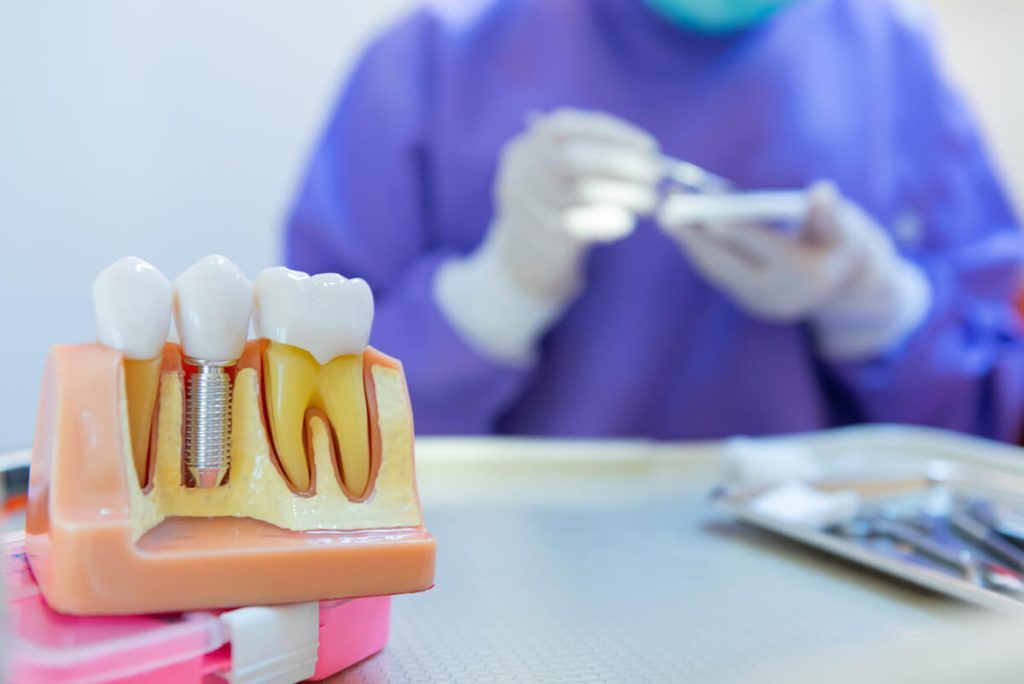All You Need to Know About Dental Implants: A Comprehensive Guide from Captivate Dental

Many people have heard about dental implants but are still determining why they are necessary.
Below are a few things you should know about dental implants if you want to learn more about them.
What are dental implants?
Dental implants are tooth replacements that mimic natural teeth in appearance and feel.
Your tooth is made up of two essential components:
- The crown, or visible portion of the teeth above the gum line,
- as well as the root, which is covered in bone and below the gum line.
The dental implant is surgically inserted into your jawbone and is frequently made of titanium metal.
When a tooth is lost, a dental implant acts as a replacement tooth or crown, acting as an artificial root. The brand-new replacement tooth looks and feels completely normal.
Do I Need Dental Implants?
If you have a missing tooth, you may wonder whether you need a dental implant or can live with the gap. However, when your teeth are pulled, your jawbone starts to atrophy due to a lack of stimulation.
Dental implants are beneficial for several non-cosmetic reasons, including:
- Maintain your teeth from shifting.
- Prevent bone loss
- Prevent plaque from forming in unsightly gaps in your teeth, which can lead to future damage and illness.
- Prevent extra stress from being applied to the teeth surrounding the hole, which can result in fractured, cracked, or shattered teeth.

What is the Process for Getting Dental Implants?
Getting dental implants typically involves multiple steps:
- Initial consultation: First, the dentist will check your oral condition, request an X-ray, and evaluate your eligibility for the procedure.
- Surgical placement: The implant is surgically placed into the jawbone. Over time, the bone gets firmly attached to the implant through osseointegration.
- Healing period: This stage may take several weeks to months, depending on your healing ability and the complexity of the procedure.
- Abutment placement: After healing, a second procedure involves placing an abutment on the implant. This abutment joins the crown and implant.
- Crown placement: A custom-made crown is secured onto the abutment, completing the restoration.
Your dentist shall help you through the process and ensure you are comfortable with what is happening.
Do Dental Implants Hurt?
Many people are concerned about the pain associated with dental implants. Drilling into the jawbone is required for implants, which can be unpleasant.
We offer local anaesthesia and sedation dentistry, depending on your pain tolerance and level of anxiety regarding the dental procedure.
Examples of common post-surgery symptoms include:
- Minor bleeding
- Gum and facial swelling
- Bruising of the gums and skin
- Pain surrounding the implant
Many patients must eat soft meals 10-14 days after surgery as their gums heal.
What Problems Might Dental Implants Cause?
A few unusual complications of dental implant surgery include:
- Infection can develop around the implant site without proper oral hygiene.
- Bleeding: Some minor bleeding is normal but should subside within a day or two.
- Nerve damage: In rare cases, the implant placement may cause temporary or permanent numbness.
- Sinus issues: There’s a small risk of sinus cavity damage for implants placed in the upper jaw.
- Implant failure: This occurs if the implant doesn’t fuse with the bone properly, which may require a replacement procedure.
Choose an experienced dentist to minimise risks and closely follow all post-surgery care instructions.
Is Dental Treatment Suitable for Everyone?
As long as there is enough bone to hold the implant in place, dental implants are ideal for people of all ages who want to replace lost teeth.
When the proper jaw bone is absent, such as in long-term tooth loss, we do bone grafting operations.
Benefits of Dental Implants
- Improved oral health
- Long-lasting and durable
- Improved speech
- Enhancement of appearance
- Increased self-confidence
How Do I Care for Dental Implants?
Taking care of dental implants is quite like taking care of natural teeth.
Follow these tips to maintain your implants and overall oral health:
- Clean the teeth twice a day by using a soft toothbrush.
- Every day, floss to remove food particles and plaque.
- If you want to maintain healthy gums, use an antimicrobial mouthwash.
- Ensure you see your dentist every six months for a check-up and dental cleaning.
Routine care of your teeth is critical in preventing further problems, especially with the implants placed.
Dental Implants at Captivate Dental
Dental implants are a great option for enhancing the appearance of teeth and restoring smiles. Before choosing, please do thorough research because it may be a lifetime investment in oral health.
For more information on dental implants in Cheltenham, call us on (03) 9553 1249, visit us on the web, or use our convenient online booking page.
If you need help from a professional Cheltenham dentist, contact us today!
We are located at 36 Chesterville Road in Cheltenham.

